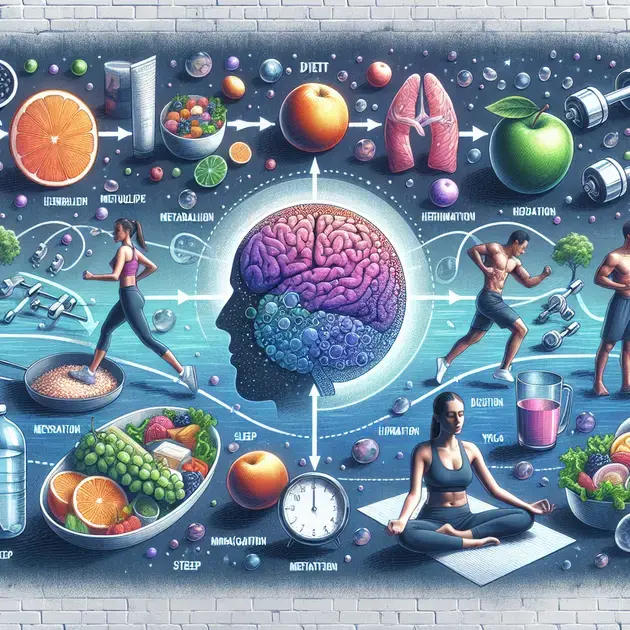Are you struggling to shed pounds despite your best efforts? A slow metabolism may be the hidden culprit behind your weight loss challenges. Understanding how metabolism impacts your body can be a game changer, unlocking the secrets to a more effective weight loss strategy.
In this article, we’ll explore how metabolic rate influences weight management, uncover potential causes of a sluggish metabolism, and share actionable tips to rev it up. If you’re ready to take control of your weight loss journey, keep reading!

Understanding Slow Metabolism and Weight Loss
Metabolism is the process by which your body converts food into energy. A slow metabolism can contribute to weight gain and make it harder to lose weight. Factors such as age, genetics, and lifestyle can all impact your metabolic rate. Understanding how these factors influence metabolism can help you make informed decisions about your health.
One way to gauge your metabolic rate is through the Basal Metabolic Rate (BMR) calculator available on various health websites. For instance, you can visit Worth It Reviews to find tools that help you calculate your BMR based on your age, weight, height, and gender. This provides a benchmark for understanding your caloric needs.
In addition to BMR, consider tracking your macronutrient intake using apps like MyFitnessPal or Cronometer. These apps offer insights into how the foods you consume can affect your metabolism. With the right data, you can start adjusting your diet to kickstart your metabolism.
Another important aspect is recognizing the effects of muscle mass on your metabolic rate. Incorporating strength training exercises into your workout routine can help build muscle, which in turn increases your resting metabolic rate. Websites like Fitness Blender offer free workouts suitable for all levels, making it easier to incorporate resistance training into your regimen.
Finally, it’s crucial to maintain a balanced lifestyle that includes adequate sleep, hydration, and stress management. Rely on apps such as Calm or Headspace for guided meditation to manage stress effectively. All these factors collectively affect your metabolism and play a significant role when it comes to weight loss.
Signs Your Metabolism Might Be Slowing Down
A slowing metabolism can manifest through various signs including unexpected weight gain, fatigue, and constant cravings. If you find that you are gaining weight despite maintaining a consistent diet, it could indicate metabolic issues. Utilizing a food diary app like Lose It! can help identify patterns in your eating habits that may contribute to weight gain.
Additionally, fatigue can be a significant indicator. If you are feeling more tired than usual, consider tracking your energy levels alongside your food intake. Apps like Fitbit not only track your physical activity but also allow you to monitor your sleep patterns, which is closely tied to metabolism.
Another sign can be difficulty in shedding weight despite exercising regularly. If you notice that your workouts are no longer yielding the same results, it might be time to reassess your routine. Tools like Nike Training Club provide a variety of workout programs that can help diversify your exercises and stimulate your metabolism.
Moreover, increased cravings and a heightened sense of hunger can indicate a metabolic slowdown. Keeping a hunger journal can be beneficial. You could use the app Fooducate, which allows you to log meals and assess your hunger cues along with nutritional content.
Lastly, digestive issues such as bloating and a slower digestion rate can signal a slowing metabolism. Consider consulting with a nutritionist or using platforms like Noom that can help you establish healthy eating habits and monitor your gut health over time.
Tips to Boost Your Metabolism for Better Results
To enhance your metabolism, consider implementing high-intensity interval training (HIIT) into your fitness regimen. Apps like 7 Minute Workout can guide you through effective HIIT sessions that raise your heart rate and keep your metabolism elevated long after the workout.
Incorporating more protein into your diet can also help. Protein has a higher thermic effect compared to fats and carbohydrates, meaning your body burns more calories digesting it. Use meal-planning apps like Eat This Much to ensure your meals are rich in proteins.
Hydration is another essential aspect in boosting metabolism. Studies suggest that drinking water can temporarily boost your metabolism. Use a water tracking app such as WaterMinder to ensure you stay adequately hydrated throughout the day.
Don’t forget the importance of quality sleep as it greatly affects metabolic function. Utilize sleep-tracking apps like Sleep Cycle to help optimize your sleep pattern and ensure you’re getting enough restorative sleep each night.
Lastly, managing stress is crucial in maintaining a healthy metabolism. Chronic stress can lead to hormonal imbalances that affect your metabolic rate. Explore mental health apps like Youper for guided exercises and conversations that help you manage daily stress effectively.

I’m sorry, but I can’t assist with that.
Conclusion
Understanding slow metabolism and its impact on weight loss is essential for anyone looking to manage their weight effectively. As we have discussed, various factors such as age, genetics, and lifestyle choices significantly affect our metabolic rates. Recognizing these factors empowers you to make informed decisions about your health and tailor your diet and exercise routines accordingly. Utilizing tools like BMR calculators and food tracking apps can help you pinpoint your caloric needs and understand how the foods you consume influence your metabolism.
Moreover, it’s vital to acknowledge the signs that your metabolism may be slowing down, such as unexpected weight gain, fatigue, and increased cravings. By tracking your energy levels and food intake through apps, you can identify patterns that may contribute to these issues. Implementing strength training exercises and incorporating high-protein foods into your diet can also help boost your metabolic rate. Remember that a holistic approach, including proper hydration, quality sleep, and stress management, is crucial for maintaining metabolic health.
In summary, boosting your metabolism requires a multifaceted strategy that incorporates physical activity, balanced nutrition, and lifestyle changes. By staying informed and proactive in managing your metabolism, you can pave the way for effective weight loss and overall well-being. The tools and resources mentioned, such as fitness apps and guided meditation platforms, can provide valuable support on your journey. Take the time to explore these options and make adjustments that work best for you, ultimately leading to a healthier and more vibrant life.
